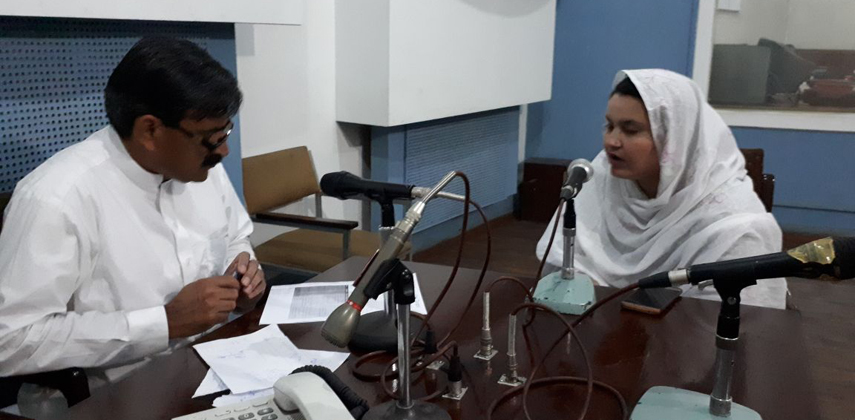July 09, 2018: The seventeenth radio program as part of the Center for Research and Security Studies’ (CRSS) counter-radicalization initiative Ulasi Taroon (Social Cohesion) was aired on May 04, 2018, on the topic of “Social Cohesion and Role of Women”.
Ulasi Taroon consciously promotes the ideals of equality, acceptance and inclusion with regard to female population besides underscoring the importance of their role in the cohesive society. The purpose of discussion was to explore different ways and possibilities to engage and involve women from different walks of life in the peacebuilding process and reinforce the ideals of social cohesion especially equality and equity regardless of gender.
The first guest in studio, Ms. Sadaf Khattak, M.Phil. fellow from University of Peshawar noted that given the vulnerability of women during conflicts and wars, their involvement in and contribution for peacebuilding processes is very critical, thus it must be one for the core considerations for social cohesion. She emphasized that our society needs to fathom the need for the inclusion of women perspectives in dialogue, policy making and peacebuilding processes. Equal onus is on the state to provide an environment and opportunities conducive to inclusion.
The guest on phone, Ms. Shahida Gul, a civil Engineer and lecturer from University of Bannu, noted that the role of a woman is very important in all areas of life whether she’s a working woman or a housewife. Women are playing a very dynamic role in all fields of life in the society. They have a central role in nation-building and are the pioneers of nation; given the importance of the varieties of role the women assume in the family including wife, leader, administrator, manager of family income and last but not the least important the mother. Given the diversity of their roles in the society, we must take them on board in the decision making processes and utilize their maximum potential for social cohesion.
The other guest on phone, Ms. Rakshanda Naz, a social activist said that the political system of Pakistan has to change the symbolic role of women in the political parties and parliament. They must consider their perspectives on the issues related to gender focused reforms, to ensure inclusive policy making.
“All women should realize the importance of their role in a peaceful and cohesive society; and must promote – in their respective capacities – the notions of equality, respect for fundamental rights, different opinions and diversity, tolerance and adherence to rule of law. These values should also be imparted to the coming generations”, said Khalida Niaz, a female journalist in the radio report.
About Ulasi Taroon
Ulasi Taroon is a counter radicalization initiative of Center for Research and Security Studies that aims to address the radicalization challenges, extremist ideologies and foster social cohesion through a discourse anchored in the core constitutional values which are fundamentally essential prerequisites for social peace and harmony. The endeavor aims to cultivate and sensitize the people of KP in the core values in the Pakistani constitution and our social contract. It’s an attempt to highlight the criticality of abiding by these ideals – such as adherence to rule of law, primacy and sanctity of constitution, equal citizenry, responsible citizenship, respect for fundamental human rights, tolerance for diversity and different opinions, inclusive democracy and good governance – as a measure of fostering social cohesion and peaceful co-existence.

